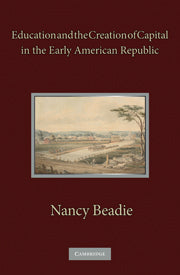Freshly Printed - allow 6 days lead
Couldn't load pickup availability
Education and the Creation of Capital in the Early American Republic
This book argues that schools were a driving force in the formation of social, political, and financial capital during the market revolution.
Nancy Beadie (Author)
9781107617001, Cambridge University Press
Paperback / softback, published 2 January 2014
368 pages, 1 b/w illus. 5 maps 8 tables
23.4 x 15.6 x 2.1 cm, 0.57 kg
"This is the history of education as it has seldom been practiced and the result is exciting and bracing. It rewards multiple readings." Ron Butchart, University of Georgia, Teachers College Record
This book argues that schools were a driving force in the formation of social, political, and financial capital during the market revolution and capitalist transition of the early republican era. Grounded in an intensive study of schooling in the Genesee Valley region of upstate New York, it traces early sources of funding and support for education (including common schools and various forms of higher schooling) to their roots in different social and economic networks and trade and credit relations. It then interprets that story in the context of other major developments in early American social, political, and economic history, such as the shift from agricultural to non-agricultural production, the integration of rural economies into translocal capitalist markets, the organization of the Second Great Awakening, the transformation of patriarchy, the expansion of white male suffrage, the emergence of the Secondary American Party System, and the formation of the modern liberal state.
Part I. Education and Social Capital Formation: 1. Introduction - the place of schooling in a transforming political economy
2. Creating social capital - norms of school and community building
3. A matter of trust - neighbors and strangers
4. Discipline - evangelicalism as an educational movement
5. Bonding and bridging - the Methodist economy
6. Development - evangelicalism and capital formation
Part II. Schools as Agencies of Politicization: 7. Between markets and the state - venture schools and academies
8. Political economies of schooling - academies and common schools
9. Education and civic engagement - schools and politics
10. Diffusing intelligence - education and formation of the liberal state
11. Denominational politics and institution-building
12. Education and coalition building
Part III. Education and Economic Transformation: 13. Education as an object of capital investment
14. Varieties of trust - education and economic competition
15. Controlling capital - education and the politics of economic change
16. Success - education and the culture of the market
17. Panic - education and the discipline of the market
18. Friends - learning the value of trust
Conclusion: education and the creation of capital
Appendix.
Subject Areas: Economic history [KCZ], History of the Americas [HBJK]


